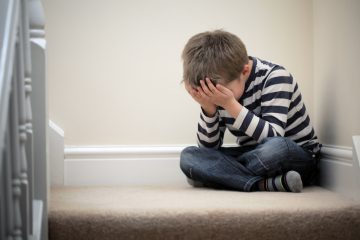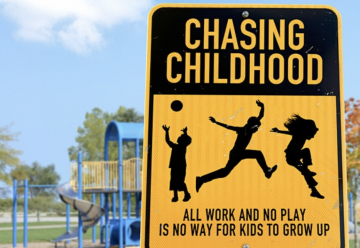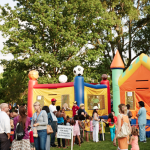Did Being a Nice Mom Hurt My Kids?
 Last Wednesday, I saw a video I thought my son, Shane, would like to see. When I called up to him to come downstairs, his immediate response was, “Are you mad? Am I in trouble?” I asked him, “Shane, when am I ever mad at you?” and his response was, “You never really are.”
Last Wednesday, I saw a video I thought my son, Shane, would like to see. When I called up to him to come downstairs, his immediate response was, “Are you mad? Am I in trouble?” I asked him, “Shane, when am I ever mad at you?” and his response was, “You never really are.”
“When do I ever yell at you?”
“You don’t, but I didn’t know if maybe I had done something without realizing and you were upset.”
It is important to note there was no guilt involved. He hadn’t done something and was afraid I was going to find out. This has happened before. He cannot stand the thought of me being mad at him, and the possibility overrides any common sense about actual events that may or may not have taken place. Shane is not perfect, and there have, of course, been many times I’ve had to correct him or redirect him. When he and his twin brother were little, I remember yelling a lot, but I’m less of a yeller now. Then, it was a matter of survival, because after raising three girls who heard me when I spoke, the boys tended to respond only to volume.
How were you raised? People in my generation tended to get in trouble, like real trouble, when we did something wrong. My husband tells stories about his father hitting him with a wiffle ball bat because it didn’t leave a mark and his mom doling out punishment with a wooden spoon. Peers share similar experiences, and the retelling is always funny. We wear our childhood struggles like badges of honor, proud to have weathered tough times and tougher parents. As adults, we love and respect our parents, and unless there was real abuse, don’t remember their punishments as excessive or inappropriate. We knew they loved us, and we also knew there were consequences for our actions. More than this, we learned how to roll with mistakes and failures. We broke rules or did something wrong and the repercussions were generally swift and short lived. We weren’t perfect, and that was perfectly fine. We were resilient. We bounced back.
I am not suggesting we start hitting our kids again. I like being a “nice” mom. I’m O.K. with my future adult kids not having stories to tell their kids about how Grandma used to lose it on them or how Grandpa used to beat sense into them. I am, however, spending a lot of time thinking about how we can help our kids live happier, more confident lives. Part of this is exploring how our parenting style has contributed to the mental health crisis our children and young adults are facing. It is worth considering how never getting into trouble or having real consequences for their actions prevents young people from accepting they will screw up. They will screw up AND they will still be loved and they will be just fine. In our desire for our kids to think we are “nice”, for our kids not to be mad at us, we do them a disservice. It is easy to see how never getting into trouble can result in entitled, spoiled adults. It might be harder to appreciate how not helping kids acknowledge their inevitable mistakes, prevents them from seeing how failing is not the end of the world.
THEY WILL SCREW UP AND THEY CAN SURVIVE. THEY NEED TO BELIEVE THIS IS TRUE, BECAUSE IT IS, AND BECAUSE IT CAN SAVE THEIR LIVES.
A large percentage of young people who attempt suicide do not suffer from depression and many of those who survive will not go on to struggle with mental illness. Very often, these tragic events are the result of an impulsive decision in the face of some difficulty or failure. There is some hardship, and they simply cannot see a way through it or over it or around it. Death seems like a better alternative to coping with the aftermath. Witnessing the disappointment of the people who have put you on a pedestal your whole, short life is a part of what seems too difficult to face. This is when the rest of us are left wondering, “Why?” He or she seemed like they had it all — great grades, superstar athleticism, nice family, tons of friends. When you are used to being a success and told that you are amazing, failure is an even tougher pill to swallow.
It doesn’t have to be a wiffle ball bat or a wooden spoon, but maybe clear messaging to our children that they are not perfect, that naturally we wish in certain moments they had behaved differently or performed better, would serve them well. If we can help them see their shortcomings and insist they take responsibility for any wrongdoing, we can give them some practice in managing disappointment. If we can do this and also make sure they understand we love them unconditionally, through the good and the bad, we can give them the confidence to face life after failure. I know we can be compassionate parents while preparing our children for the hard stuff which will inevitably come. If we always focus on being nice, if we dismiss any mistakes as not their fault and if we protect them from any challenge, we will be sending our kids into battle unarmed. They will screw up and they can survive. They need to believe this is true, because it is, and because it can save their lives.
For more on how we can help our kids grow up happier and more resilient,
check out: Our Kids Are Falling Into Well We Cannot See
How Much More Can Our Kids Take
This is Just What I Needed to Hear Today























